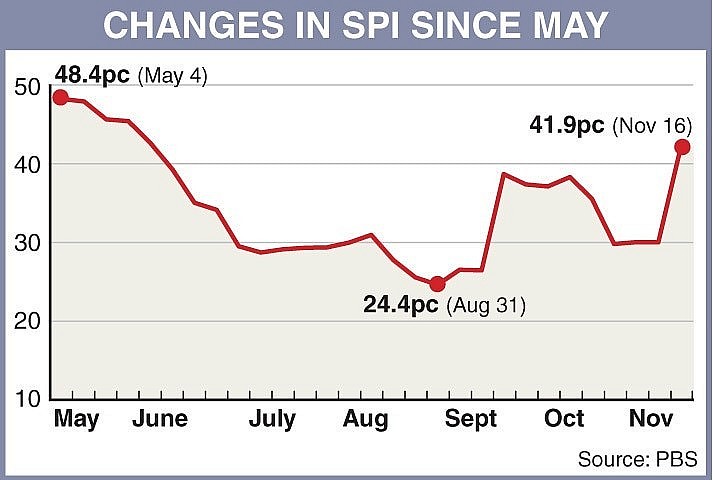Gas price hike fuels short-term inflation to 42pc
 |
The inflation reading stood at 41.9pc for the week ending Nov 16, the Pakistan Bureau of Statistics (PBS) said, mainly because of over 1,100pc increase in gas charges compared to a year ago.
Other items whose prices increased the most included cigarettes (94.5pc), wheat flour (86.4pc), chilli powder (81.7pc), broken basmati rice (76.7pc), garlic (63.6pc), IRRI 6/9 rice (61.9pc), tea (54.6pc), gur (51pc), and sugar (50pc).
In contrast, the prices of onions dropped 36.2pc year-on-year, followed by tomatoes (-14pc), mustard oil (-3.95pc), vegetable ghee (-2pc) and pulse gram (-0.5pc).
The short-term inflation, measured by a basket of goods and services called the Sensitive Price Indicator (SPI), also saw a massive increase compared to the previous week, rocketing to 10pc in the Nov 11-16 week from just 0.73pc a week ago.
The SPI, which currently stands at 309, is computed weekly to assess the prices of essential commodities and services at shorter intervals. The index comprises 51 items collected from 50 markets in 17 cities.
The PBS data showed that the prices of 25 items increased, those of 13 items decreased and those of 13 items remained almost unchanged compared to the previous week.
The items whose prices saw the highest increase week-on-week included gas (480pc), tea packet (8.9pc), pulse masoor (5.3pc), chicken (4pc), garlic (3pc), salt powdered (2.9pc), wheat flour (2.6pc), tea prepared (2.07pc), LPG (2.03pc), and potatoes (2pc).
On the other hand, the items with the highest price decreases included electricity charges (-16pc), tomatoes (-11.2pc), sugar (-4.2pc), diesel (-2.2pc), onions (-1.49pc), vegetable ghee (-1.39pc), petrol (-0.73pc), cooking oil (-0.65pc).
On an annual basis, the SPI inflation hit a record 48.35pc in early May but then cooled to as low as 24.4pc in late August before crossing 40pc last week.
From Nov 1, the caretaker government notified a substantial hike of 194pc in natural gas prices. In addition, consumers will also witness an unprecedented surge in fixed monthly gas charges, up to 3,900pc for protected and non-protected consumers.



